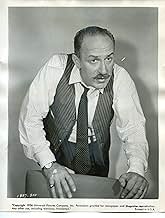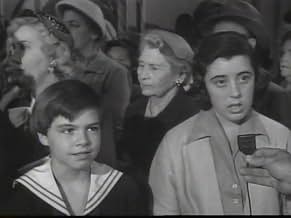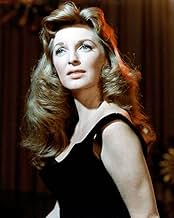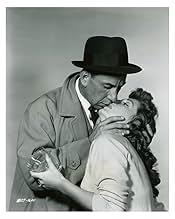AVALIAÇÃO DA IMDb
6,9/10
536
SUA AVALIAÇÃO
Adicionar um enredo no seu idiomaJoe Harris, preparing a eulogy for popular radio commentator Herb Fuller, finds that nobody has a good word to say about him.Joe Harris, preparing a eulogy for popular radio commentator Herb Fuller, finds that nobody has a good word to say about him.Joe Harris, preparing a eulogy for popular radio commentator Herb Fuller, finds that nobody has a good word to say about him.
- Indicado para 1 prêmio BAFTA
- 3 indicações no total
Edward Platt
- Dr. O'Connor
- (as Edward C. Platt)
Dorothy Abbott
- Stewardess
- (não creditado)
Walter Bacon
- Mourner
- (não creditado)
Avaliações em destaque
The Great Man stars Jose Ferrer, Dean Jagger, Keenan Wynn, and Ed Wynn. It is, at times, a brutal portrayal. Of the radio (and I suspect TV) business, similar to the electric "Network" that was to come out 20 years later. Dean Jagger gives the performance of his career, and Keenan Wynn also gives the performance of his career, as well. Ed Wynn is very good, and Jose Ferrer is very convincing in the lead. A great radio personality dies, and a reporter gathers all he can about him before broadcasting an hour eulogy. Like most people of the world, the radio personality is neither good, nor bad, but human. So, the reporter must decide whether to do a hatchet job or a puff piece. Some very interesting dynamics.
When I was a kid in the 1960's, my father came back from Las Vegas smitten with a singer he had seen in one of the casino showrooms. Her name was Julie London.
I hadn't seen or heard of London again until I saw this film on TCM one night. I immediately agreed with my father. She, and the rest of the cast, were great in this movie.
Ed Wynn, who I also remember from my childhood as a comic fool on 1960's TV, turns in what in my opinion was an Oscar winning performance as the oddball manager of a religious radio station in a small town. His son, Keenan Wynn, turns in his usual loud, braying performance as an abrasive talent manager. And Jose Ferrer was impeccable as the man in the middle, who has to decide between honesty and cash.
I agree with another reviewer that the sound quality was terrible. I watched it with closed captioning, and the word "(unintelligible)" popped up more often than it should. But it doesn't distract from the context, which is fascinating. I highly recommend this forgotten gem.
I hadn't seen or heard of London again until I saw this film on TCM one night. I immediately agreed with my father. She, and the rest of the cast, were great in this movie.
Ed Wynn, who I also remember from my childhood as a comic fool on 1960's TV, turns in what in my opinion was an Oscar winning performance as the oddball manager of a religious radio station in a small town. His son, Keenan Wynn, turns in his usual loud, braying performance as an abrasive talent manager. And Jose Ferrer was impeccable as the man in the middle, who has to decide between honesty and cash.
I agree with another reviewer that the sound quality was terrible. I watched it with closed captioning, and the word "(unintelligible)" popped up more often than it should. But it doesn't distract from the context, which is fascinating. I highly recommend this forgotten gem.
Jose Ferrer should be better known as a director. Yes, it has some of the plot of Well's Kane, but it has more of the feel of a Jack Webb flick, he himself a greatly under rated director. Even Julie London, Webb's wife is in it.. Hard boiled hero, quirky supporting characters that are given a rounded humanity, and a great cast. See this film when it plays on Turner. And check out Webb's non Dragnet films; 30, the DI, Pete Kelly's Blues and The last time I saw Archie.
The immense influence Orson Welles' CITIZEN KANE (1941) has had on the language of cinema is well documented. So, to a lesser degree, is the freedom it gave film-makers – not always of comparable talent – towards (vaguely autobiographical) self-indulgence in their work. Yet another ripple it undeniably created (actually borrowed from THE POWER AND THE GLORY {1933}, which I own but have yet to watch!) led to a whole series of films taking a sour look at the American dream, depicting – via their flashback structure – the rise and fall of a successful but, at heart, unscrupulous public figure. Among these are RUTHLESS (1948), ALL ABOUT EVE (1950), THE BAD AND THE BEAUTIFUL (1952), Welles' own MR. ARKADIN aka CONFIDENTIAL REPORT (1955), THE Oscar (1966), etc.
THE GREAT MAN, then, is one such effort – and an unfairly neglected example into the bargain (even if both the Leslie Halliwell and Leonard Maltin movie guides are duly complimentary in their assessment) which rather suggests that it stands up better than other, more renowned titles in this vein! It also emerges as the most significant directorial venture by star/co-writer Ferrer. For the record, I own all 7 of the pictures he helmed – but, perhaps tellingly, this was only the second I have checked out (and which I opted to watch on the occasion of his birthday). Given the Oscar winner's reputation as a thespian, his choice of 'personal' projects was – for the most part – curiously bland and commercial in nature!
Setting this apart from the established formula is the fact that the subject of the expose' is never shown; we only learn about him – and, consequently, formulate our own opinion – from the way others (who knew him intimately, professionally or just vicariously through his popular radio show) react to news of his passing in a traffic accident. Besides, running concurrently with the main plot (the compiling of information by a small-time radio personality – played by Ferrer himself – for a "heart-rending" eulogy, to be delivered in a live broadcast by the network to commemorate "the great man") are the hero's conflicting emotions about his increasingly unpleasant and "phoney" task especially since he was being all but promoted as the deceased's successor on the airwaves!
Ultimately, the trump-cards here – which make all the difference – are the smartly cynical script (co-adapted by novel author Al Morgan) and a first-rate cast that, apart from Ferrer (in fine form), includes: real-life father and son Ed and Keenan Wynn (credited with, respectively, discovering and nurturing the ungrateful and opportunistic titular character); Julie London (as a chanteuse and his alcoholic mistress); and Dean Jagger (as the Machiavellian network head). Incidentally, the copy I viewed of this one was pretty substandard for the digital era (which has well and truly spoiled us movie-buffs, it must be said!) and, while a somewhat better-quality version does exist online, I had difficulty acquiring it...
THE GREAT MAN, then, is one such effort – and an unfairly neglected example into the bargain (even if both the Leslie Halliwell and Leonard Maltin movie guides are duly complimentary in their assessment) which rather suggests that it stands up better than other, more renowned titles in this vein! It also emerges as the most significant directorial venture by star/co-writer Ferrer. For the record, I own all 7 of the pictures he helmed – but, perhaps tellingly, this was only the second I have checked out (and which I opted to watch on the occasion of his birthday). Given the Oscar winner's reputation as a thespian, his choice of 'personal' projects was – for the most part – curiously bland and commercial in nature!
Setting this apart from the established formula is the fact that the subject of the expose' is never shown; we only learn about him – and, consequently, formulate our own opinion – from the way others (who knew him intimately, professionally or just vicariously through his popular radio show) react to news of his passing in a traffic accident. Besides, running concurrently with the main plot (the compiling of information by a small-time radio personality – played by Ferrer himself – for a "heart-rending" eulogy, to be delivered in a live broadcast by the network to commemorate "the great man") are the hero's conflicting emotions about his increasingly unpleasant and "phoney" task especially since he was being all but promoted as the deceased's successor on the airwaves!
Ultimately, the trump-cards here – which make all the difference – are the smartly cynical script (co-adapted by novel author Al Morgan) and a first-rate cast that, apart from Ferrer (in fine form), includes: real-life father and son Ed and Keenan Wynn (credited with, respectively, discovering and nurturing the ungrateful and opportunistic titular character); Julie London (as a chanteuse and his alcoholic mistress); and Dean Jagger (as the Machiavellian network head). Incidentally, the copy I viewed of this one was pretty substandard for the digital era (which has well and truly spoiled us movie-buffs, it must be said!) and, while a somewhat better-quality version does exist online, I had difficulty acquiring it...
Just as Charlie Kane was based on William Randolph Hearst, great man Herb Fuller was based on TV and radio icon Arthur Godfrey. I believe several of the story lines in Great Man paralleled events in Godfrey's life. The one that stands out involved a `boy singer' that was fired by Herb Fuller. In real life Arthur Godfrey fired `boy singer' Julius LaRosa. I have heard that Godfrey the `old redhead' was none too pleased with Jose Ferrer's film.
There is a brilliant scene in the film where the hard-boiled, cynical reporter Joe Harris (Jose Ferrer) meets a former employer of great man Herb Fuller, the guy who gave Fuller his start in broadcasting. Harris and his secretary make fun of Paul Beaseley (veteran actor Ed Wynn, who only has this one scene), a doddering old bumpkin who owns a small radio station in New England. Beaseley tells a story that reveals the two sides of Herb Fuller a folksy, down-to- earth radio personality that people love on the one hand and a mean-spirited, drunken rat bastard on the other. At the end of the scene Beaseley says something like, `I know that some people find me ridiculous' and Harris, no longer mocking Beaseley, replies, `Mr. Beaseley, I don't find you ridiculous at all'. This is one of my favorite movie scenes of all time.
There is a brilliant scene in the film where the hard-boiled, cynical reporter Joe Harris (Jose Ferrer) meets a former employer of great man Herb Fuller, the guy who gave Fuller his start in broadcasting. Harris and his secretary make fun of Paul Beaseley (veteran actor Ed Wynn, who only has this one scene), a doddering old bumpkin who owns a small radio station in New England. Beaseley tells a story that reveals the two sides of Herb Fuller a folksy, down-to- earth radio personality that people love on the one hand and a mean-spirited, drunken rat bastard on the other. At the end of the scene Beaseley says something like, `I know that some people find me ridiculous' and Harris, no longer mocking Beaseley, replies, `Mr. Beaseley, I don't find you ridiculous at all'. This is one of my favorite movie scenes of all time.
Você sabia?
- CuriosidadesLoosely based on the career of Arthur Godfrey.
- Erros de gravaçãoWhen Joe, Mike, and Jinny are listening to the "blood bank" tape, the VU meter has no relation to the audio.
- Citações
Ginny: Feet of clay, huh?
Joe Harris: Right up to the knees, at least.
- Cenas durante ou pós-créditosFerrer modestly omitted himself from the cast list at the end of the film.
- ConexõesVersion of Pretendent (1987)
- Trilhas sonorasThe Meaning of the Blues
Words and Music by Bobby Troup and Leah Worth
Performed by Julie London
[The song comes on the radio in Carol's apartment]
Principais escolhas
Faça login para avaliar e ver a lista de recomendações personalizadas
Detalhes
- Data de lançamento
- País de origem
- Idioma
- Também conhecido como
- The Great Man
- Locações de filme
- Universal Pictures Building, 445 Park Avenue, Nova Iorque, Nova Iorque, EUA(Amalgamated Broadcasting building)
- Empresa de produção
- Consulte mais créditos da empresa na IMDbPro
- Tempo de duração1 hora 32 minutos
- Cor
Contribua para esta página
Sugerir uma alteração ou adicionar conteúdo ausente

Principal brecha
By what name was A Luz de uma Ilusão (1956) officially released in India in English?
Responda





























